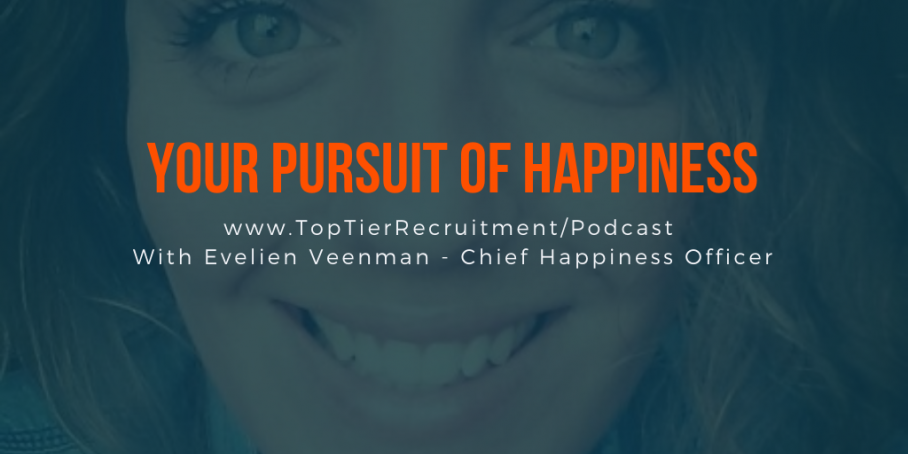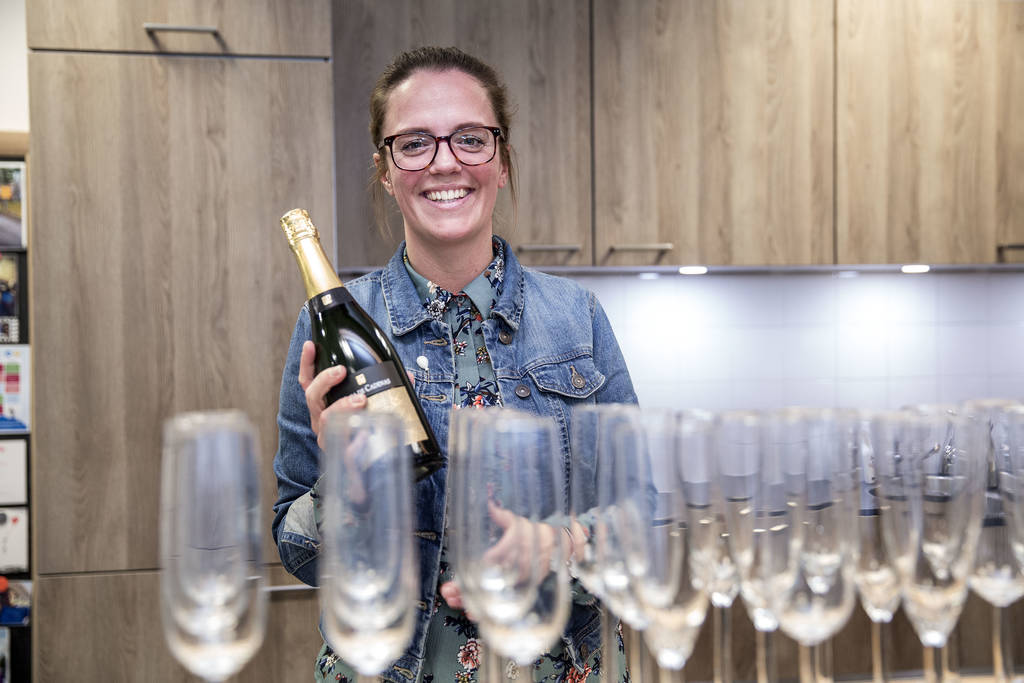Chief Happiness Officer: Evelien Veenman

Laura & Paul had a fascinating discussion with Evelien Veenman about her unusual role as Chief Happiness Officer at the innovative Dutch company, Experius.
Read on or listen to the discussion below.
While You're Here: Get The Employee Retention Guide
Looking for some fresh ideas on how to retain your staff in times of increasing employee turnover?
The Employee Retention Guide features helpful tips and advice for financial services & FinTech employers from industry experts.
You can download the free Employee Retention Guide now.
Podcast Interview
Ok, let's get into the discussion . . .
About Evelien
Evelien Veenman: I live in Utrecht and I also work in Utrecht in the Netherlands. I did study social work and I've always been interested in psychology. And the last years I've grown into the role of chief happiness officer at Experius, and for me, it's all about creating a great place to work. And I do my best every day to provide for the general wellbeing of the employees at Experius. And I do this through my own happiness at work model, and it has a few components. Safety and trust are two of them. They are the basic condition for happiness. If there's no safety within the organization or team or trust, then it's hard to be happy at your workplace.
Evelien Veenman: And also, connection, having a true connection with your own activities, with your colleagues. And also with the mission of the company that you work at. And progress is also an important element. And progress can mean something different to one person and to another. Some want to develop quicker than others, and some people just want to know what do I need to do to be good at my job.
Evelien Veenman: I've noticed a lot of people don't know this, and also appreciation is very important. To give and to receive positive reinforcement, I think we can do that a lot more as adults. And I think it's very important that a chief happiness officer has a lot of empathy, can listen well, and can make a connection between people.
Paul: Evelien, in terms of something you mentioned around connections, and we spoke about this before, why is making that connection and being part of something and creating value more important today than it was previously?
Evelien Veenman: Yeah, I'm not sure if it's more important today. I think you go way back in history, people always wanted to be a part of something. And I think maybe now more than ever, but yeah, I don't think it's a trend in recent years, but I do think the nature of our work has changed. Also, the clear separation between work-life balance is more off than ever. And this is due to the increased accessibility to be able to work everywhere. For example, wifi, mobile phones, you can read your email before going to sleep. So, due to these growing technological developments, we are increasingly interested in everything and everyone. And at the same time, we are more lonely than ever.
Evelien Veenman: Positive psychology has been around since I think 1998, so this is already 21 years ago. And the role of Chief Happiness Officer has started in the last four years, so that is more recent. What we see in our company is that Millennials realize more than their previous generations that work-life balance is becoming increasingly vague. And that it's important that your employer delivers a positive contribution in this regard.
Paul: Okay. And I suppose you talked a lot about technology and blurred lines between and outside of work. Do you think technology has had a massive impact in terms of how we work and how we operate and happiness I suppose overall?
Evelien Veenman: Yeah, because what I said is you can now work everywhere you want to, and it's really easy when you are at home with your family or alone to open your laptop or even on your phone, or now also on your watch to check incoming emails or that kind of stuff. And what neuropsychology also says, it's not good for your brains. So, our brains are on the whole time. Due to all this, yeah, the TV, the mobile phone, all these things. And I think that was a lot different when we didn't have that at home.
Evelien Veenman: So, our brains need different activities to be able to relax and at the end of the day that also helps in being happier.
Laura: Excellent. Evelien, just back to happiness, what is it and what is happiness at work?
What Is Happiness At Work?
Evelien Veenman: Yeah, good question. There is a difference between happiness and happiness at work. Of course, no one else can be accountable for your happiness but yourself. And in my role as the chief happiness officer, I can't make an unhappy person happy, but I can create an environment in which people can feel safe, have fun, and develop themselves. I think happiness is a state of mind, it's a combination of how satisfied you are with your life and how good you feel on a day to day basis. And happiness at work means experiencing fun, meaning and fulfillment, and also having a say.
Paul: In terms of your own then as chief happiness officer, and again we talked about this before, it's not the most common title in the world. Is there a risk that a chief happiness officer role can be potentially seen as smiling as a bit silly? Just curious, what's the real benefit of a role like that for a business?
Evelien Veenman: Yeah, well I do get a lot of laughs indeed when people hear chief happiness officer. So, the title is a bit laughable but the job is very serious and necessary. And the real benefit if someone on the sideline who has the time for your employees so they can share, feel appreciated, and make a true connection. Someone who listens and has attention for each person to create in a sport of positive workplace culture.

Evelien Veenman: So, yeah, it's for a better environment for employees and also for the employer. And a happy employee often means a more productive employee, so also better functioning. And then at the end of the day a more happier and loyal customer. So, it's good all-around to have a Chief Happiness Officer.
Paul: So, you talked about productivity. I suppose just with my management hat on almost, are there tangible benefits in terms of reducing turnover, reduced absenteeism, increased productivity? Is there something you can measure.
Evelien Veenman: Yeah, you can measure that. We also measure ... we ask for people every week to give a grade on their happiness at work. And also, how much workload they experience. Yeah, but we also notice and I think you can recognize that also with yourself when you have a good day, you are way more productive, you think in more solutions. You are nicer to the people around you. So yeah, it makes sense that when you are happier, you're also better at your work. You're less likely to call in sick or that kind of stuff.
Paul: Yeah. I think when you're happy everything just seems a little bit easier.
Evelien Veenman: Yeah. And it's not ... happiness doesn't mean you have to be happy all the time. Happiness and sadness are not opposites. Happiness means that you can allow all emotions, so also fear, anger and grief. So happiness doesn't mean only smiling the whole time, but you are ... you think more in solutions and you have more, how do you say it? I'm looking for the right words. Resilience. Yes.
Paul: Resilience is becoming more and more important I think in today's work environment.
Evelien Veenman: Yes.
Laura: Evelien, just switching over to a question that might be of interest to our job seekers listening to this podcast, so company culture has become more and more important for people. So, if a job seeker is in an interview scenario, what clues into a new company's culture should they look out for?
Company Culture Clues
Evelien Veenman: Well, I think you can do different things. First of all check the company's website and also check their social posts. It can tell you a bit if a company is, for example, formal or informal, like us. And see if they have won any awards in being a good employer. For example, talent development or sustainable employability, that can give you some clues. And also, when you're at a company for your first job interview, check the office space. Can you feel a good vibe? Are the employees talking to each other? Do they say hi to you? How is the interview? Really try to feel the atmosphere. And if you're not convinced, ask if you can go operate for a day.
Evelien Veenman: And also I think important is check your own network carefully. Where do your friends and maybe old fellow students, do they have good recommendations for good employers?
Paul: And being really conscious that good can mean different things for different people, and some people prefer different cultures to others.

Paul: How would you advise someone to know or understand what type of culture they'd like to work in?
Evelien Veenman: I think you would have to check your previous jobs or experience. And really think what appealed to me and what not? What gives you energy? I think in general good self-reflection about previous experience and strong self-knowledge. Do you need a lot of freedom and ownership, or do you like a manager who tells you what to do? One person thrives on a formal structure where this is more clarity and rules and procedures, and the other more on an informal structure with for example self-managed teams like us.
Evelien Veenman: So, in short, I think to gain some experience and learn from it.
Laura: Sure. Thank you so much for that, Evelien.
Evelien Veenman: Maybe also listen to your intuition. It tells you a lot more than you sometimes think. Feel your gut. When you are somewhere for the first job interview and it doesn't feel good, then it's probably not your best environment.
Laura: Evelien, what quick tips and best practice advice would you have for companies looking to improve happiness overall?
How To Improve Happiness In Your Company
Evelien Veenman: Well, first of all, of course, hire a Chief Happiness Officer. But also what we do, what I said before is the happiness index. So we ask people for a grade for their happiness at work, and also their workload. And really intervene if someone has a low grade, so talk to someone, what can we do to make it better? And also some companies have for one year or two times in one year have a conversation with their people. We have biweekly dinners. So, talk to your people a lot so you know what's going on and so you can help them.
Evelien Veenman: Coaching also, we have a coach coming every Wednesday to talk to people. And very important, celebrate your successes and also fuck ups if I can say it like that. Really, there are a lot of successes in a company small and big, but because everything is going so quickly, you forget them. So, celebrate them with your team. And we have self managing teams, which means a lot of freedom for people so they can do their job how they think it fits them well. And also fun the work, no one said you can't have fun at work.
Evelien Veenman: I also do a lot of work outings, so people just get to know each other. And often when they get to know each other better, there's also more trust.
Paul: Great stuff there Evelien for companies who want to really look at happiness and how they can implement that. Well, thank you for your time, really appreciate it and it's been a really interesting conversation.
Evelien Veenman: Yeah, I also liked it. I maybe have one tip for individuals, because of course you can not always change the situation, but you can change how you look at the situation. You have a lot more influence perhaps than you think on your own happiness.
Paul: I agree. Certainly something I've discovered through coaching anyway. But thanks again for your time, Evelien, and let's try and make companies happy.
Evelien Veenman: Yes, that would be great!
Need Help?
If you want any information or are interested in one of our roles in the Fintech and financial services industry, get in touch with us at Top Tier Recruitment.
Check out our podcast and, if there's ever anything that you would like discussed, feel free to get in touch, info@ttrmail.com.